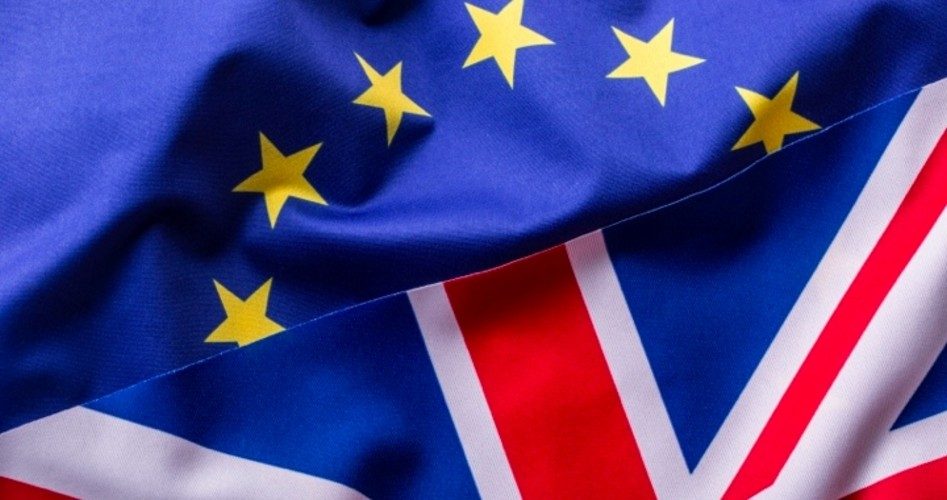
Britain’s June 23 referendum on exiting the European Union (the “Brexit”) has the New World Order forces at the EU, the Council on Foreign Relations, the Trilateral Commission, the European Council on Foreign Relations, and other globalist centers wailing and gnashing their teeth. As we reported earlier this week, a recent WikiLeaks document revealed a telephone conference call among top International Monetary Fund officials hinting at causing a destabilizing financial “event” tied to the IMF Greek debt deal before the Brexit vote. And this was followed up by several public statements by IMF chief Christine Lagarde warning of the dire consequences of the Brexit.
On April 7 the Council on Foreign Relations (CFR) issued a “CFR Backgrounder” entitled, “The Debate Over ‘Brexit,’” the organization’s latest salvo in its ongoing series of attacks aimed at stopping the British people from reclaiming their freedom, sovereignty, and independence. Over the past two years, as momentum for the Brexit escalated — and especially since the beginning of this year, after British Prime Minister David Cameron announced the Brexit vote would be held in June — the CFR and its allies have been carrying forth a non-stop campaign to frighten British businesses, British workers, and British pensioners away from supporting the Brexit.
In a recent syndicated column for Project Syndicate (a media project of George Soros), entitled “Brexit and the Special Relationship,” CFR President Richard Haass repeated the warning that a vote to exit the EU would jeopardize the UK’s “special relationship” with the United States. Haass conceded that he is “an outsider,” and the decision “whether to remain part of the European Union is obviously one for the British people and their elected representatives to make.” However, Haass stated, “many other Americans” shared his view that “a decision by the United Kingdom to exit the EU would be undesirable — indeed, highly undesirable.”
Haass, of course, is indeed an outsider, in that he is not a citizen of the UK. But as president of the CFR he is an insiders’ insider. Moreover, the CFR, as an organization, and its leading members — operating both in the private sector and as officials of the U.S. government — have played central insider roles at every stage of development of the EU, from the post-World War II Marshall Plan and the European Coal and Steel Community, on up through the Maastricht and Lisbon treaties, to the current migration and euro financial crises. We provided an extensive historical review of this CFR-EU relationship in our 1989 article, “The United States of Europe.”
So, let’s be clear: When Haass says “many other Americans” view the Brexit as “highly undesirable” he is talking not about any significant portion of America’s general population; he’s talking, of course, about the power elite coterie that he represents. The CFR’s new Backgrounder, “The Debate Over ‘Brexit,’” by CFR economics writer James McBride, warns:
Leaving the EU would carry major risks. The UK would, among other things, face the possibility of losing preferential access to its largest trading partner and the disruption of its large financial sector. Meanwhile, a Brexit could accelerate nationalist movements across the continent, from Scotland to Hungary, with unpredictable consequences for the European project.
Ah yes, “the European project,” the code phrase that, until recent years, was used in private among CFR Insiders and their EU counterparts to refer to their secret objective of gradually creating a continent-wide super-state, while publicly proclaiming they were merely advancing free trade, mobility, and prosperity.
“The UK didn’t join the EEC until 1973,” notes McBride. “The British people approved membership in a 1975 referendum, but suspicion of political union with the rest of Europe remained strong. Critics argued that the European project was already moving beyond mere economic integration and toward a European ‘superstate.’”
And the critics were absolutely correct, as history indisputably proves. “As integration deepened throughout the 1980s and 1990s, the UK’s leaders pushed for opt-outs,” the CFR’s McBride continues. “The UK didn’t join the single currency or the border-free Schengen area, and it negotiated a reduced budget contribution. Prime Minister Margaret Thatcher declared in 1988 that ‘we have not successfully rolled back the frontiers of the state in Britain only to see them re-imposed at a European level.’”
McBride warns that the Brexit will have serious economic consequences. “The UK is highly integrated with the rest of the EU in terms of trade, investment, migration, and financial services,” he says. “The pro-Remain side cautions against risking that relationship: Cameron warns about a ‘leap into the dark’ while Finance Minister George Osborne foresees a ‘convulsive shock.’”
“For Adam Posen, president of the Peterson Institute for International Economics and former voting member of the Bank of England, the pro-Brexit economic arguments are a ‘fantasy,’” says McBride. Posen is hardly an impartial, authoritative source to be quoting. As a member of the CFR, an executive committee member of the Trilateral Commission, and president of the Peterson Institute, Posen is a key Insider pushing for global “integration,” with the ultimate aim of world government. His biography at the Peterson Institute’s website notes that in 2009 Posen was appointed as “an external voting member of the Bank of England’s rate-setting Monetary Policy Committee (MPC). During this critical period for the world economy, he was a prominent advocate of activist policy response to the financial crisis, successfully led the MPC into quantitative easing.” It is no “fantasy” to say that the economic and monetary policies Posen championed — including the series of bank and corporate bailouts and the QE-to-infinity central bank moves — have been as disastrous for taxpayers and savers as they have been lucrative to the recipient banksters and corporatists.
Migration Disguised as Immigration
The CFR’s McBride acknowledges that alarm in the UK over the EU’s migration/refugee crisis is a major driver of the Brexit campaign, but says these concerns are overblown. He again cites CFR/Trilateral Commission/Peterson Institute globalist Adam Posen, who argues that “immigration drives growth.” This, apparently, is supposed to be a definitive response to widespread British and European alarm over the huge security concerns and economic costs of dealing with the migrant/refugee tsunami that is flooding the continent.
It is also intended to reinforce the false charge that it is bigotry, racism, and xenophobia that are driving the Brexit efforts in the UK, and similar efforts elsewhere in the EU. However, most Brexit supporters are not opposed to immigration; they are opposed to massive, unrestricted migration, and the plans of the United Nations and EU elites to force EU acceptance of millions of (mostly Muslim) “refugees.”
Admission: Cameron’s EU “Reforms” Are “Mostly Inconsequential” and “Trivial”
McBride and the other CFR talking heads that have been packing the blogosphere, news broadcasts, talk shows, and op-ed pages point to the EU “reforms” negotiated by Prime Minister Cameron as a valid reason for Brits to reject the Brexit. However, even the CFR’s own experts have admitted that the Cameron “reforms” are merely “political theater,” “mostly inconsequential,” and “do not amount to much in practice.”
A pro-EU/anti-Brexit article in the CFR journal Foreign Affairs this past February 28, entitled, “Should It Stay or Should It Go?: The Brexistential Crisis,” essentially confirms what Cameron’s critics in the pro-Brexit Camp have been saying all along. Authored by Professors R. Daniel Kelemen (Rutgers University) and Matthias Matthijs (Johns Hopkins University), the Foreign Affairs article candidly concedes the following about the Cameron charade:
The reforms agreed to last week are mostly inconsequential, but the negotiations between the United Kingdom and its EU partners were never about substance. The summit was largely a charade organized for British domestic consumption. Against the odds, Cameron’s Conservative government swept to power last year pledging to negotiate “a new settlement for Britain in Europe” before holding a referendum on whether the United Kingdom should remain a member of the European Union. Cameron hoped that on the basis of this new deal, most Conservative Members of Parliament would join him in supporting the “in” campaign. Ultimately, Cameron wants the British people to vote to keep his country in the Union. Thus the political theater surrounding the summit last week was designed to enable Cameron to claim that he had fought tooth-and-nail for British interests and won significant concessions from the European Union—even if the reforms do not amount to much in practice. With the renegotiations finally completed, the real battle has now begun in earnest.
The Vote Leave campaign, a pro-Brexit group, correctly points out that not only are the Cameron concessions “trivial” but they are also non-binding. “The British public want to end the supremacy of EU law and the European Court and take back control over our borders, economy, and democracy,” the Vote Leave campaign argues.
“The Government’s deal delivers none of this,” Vote Leave continues. “The European Court of Justice is in charge of exactly the same things after the deal as it was before the deal.” The Vote Leave website points out:
Before the general election, the Prime Minister promised “fundamental change” in our relationship with the EU and “full-on Treaty change” before the referendum. That isn’t happening.
All Cameron has got is a promise from other leaders to think about including some trivial changes in the EU Treaties in a few years time, 1) if they are still leaders, which they might not be, and 2) if the Treaties can be changed at all which they might not be given that Treaty change requires unanimous agreement among all 28 members, which it is impossible to guarantee in advance. We don’t even know who might be leading these countries in five years time — never mind what they might agree.
In other words, Cameron’s farcical “negotiations” are a sellout, a betrayal — both of his Conservative Party and his nation — in much the same way that Republican leaders in the United States (Dole, Gingrich, Boehner, Bush Sr., Bush Jr., McConnell, Hatch, Ryan, et al) have repeatedly betrayed conservatives and the American public for decades, in one “deal” after another.
Having already thrown just about every threat imaginable at the British voters, and with no new arguments to make, the globalists will have to resort to amping up the volume and tempo of their anti-Brexit jihad, in the hopes that repetition and celebrity endorsements will stop the exit. However, if it appears that that course of action is failing, they can always resort to more drastic measures, such as causing an economic crisis or a national security crisis to sabotage the Brexit. Do not be surprised if that happens.
Related articles:
WikiLeaks: IMF Plans New Economic Crisis Before Brexit Vote
Dirty Campaign to Stop Brit EU Exit: Refugee Deluge, Interrogating Schoolkids, Hiding Tax Hikes
UK’s Cameron, Osborne Urge G20 to Scare Brits to Vote Against EU Exit
Fake “Anti-Establishment” Movement Demands More Power for EU
Sharia Sunset: The Islamization of Europe Continues Unabated
EU Exploits Refugees to Usurp More Power, Build Armed Force
New Book Exposes Failed Immigration Policies of Former U.K. Prime Minister Tony Blair
Dirty Campaign to Stop Brit EU Exit: Refugee Deluge, Interrogating Schoolkids, Hiding Tax Hikes
EU Bosses Step Up Bullying, Propaganda to Combat Euroskepticism


